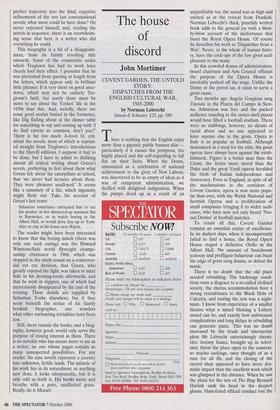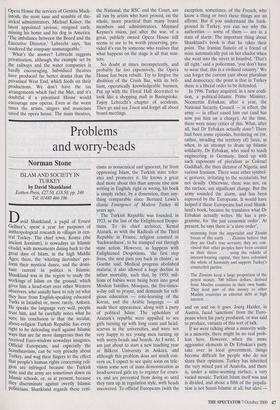The house of discord
John Mortimer
COVENT GARDEN, THE UNTOLD STORY: DISPATCHES FROM THE ENGLISH CULTURAL WAR, 1945-2000 by Norman Lebrecht Simon & Schuster, £25, pp. 580 There is nothing that the English enjoy more than a gigantic public banana skin particularly if it causes the pompous, the highly placed and the self-regarding to fall flat on their faces. When the Dome, announced as a celebration of national achievement to the glory of New Labour, was discovered to be as empty of ideas as it was of competent administration, we thrilled with delighted indignation. When the pumps dried up as a result of an unjustifiable tax, the mood was as high and excited as at the retreat from Dunkirk. Norman Lebrecht's thick, punchily written book adds to the general joy with a blow- by-blow account of the misfortunes that beset the Royal Opera House. Of course he describes his work as 'Dispatches from a War'. Never, in the whole of human histo- ry, have the cock-ups of the few given such pleasure to the many.
In this crowded drama of administrators, board chairmen and Arts Council officials the purpose of the Opera House is inevitably pushed off the stage. Unlike the Dome or the petrol tax, it exists to serve a great cause.
Two months ago Angela Gorgious sang Traviata in the Piazza del Campo in Sien- na. Admission was free and the packed audience standing in the oyster-shell piazza would have filled a football stadium. There were no stabbings, however, no shouts of racial abuse and no one appeared to knee anyone else in the groin. Opera in Italy is as popular as football. Although denounced as a treat for the elite, the great operas have always been against the estab- lishment. Figaro is a better man than the Count, the Jester more moral than the Duke and the great Verdi operas heralded the birth of Italian independence and democracy. Even in England, in spite of all the machinations in the corridors of Covent Garden, opera is now more popu- lar than ever, with the Welsh National and Scottish Operas and a proliferation of small companies bringing it to wider audi- ences, who have now not only heard 'Nes- sun Dorma' at football matches.
To retain all this, Covent Garden remains an essential centre of excellence. In its darkest days, when it incompetently failed to find a home, the Royal Opera House staged a definitive Otello in the Albert Hall. No amount of boardroom jealousy and profligate behaviour can blunt the edge of great sung drama, or defeat the music.
There is no doubt that the old place needed rebuilding. The backstage condi- tions were a disgrace to a so-called. civilised society, the chorus accommodation bore a strong resemblance to the Black Hole of Calcutta, and storing the sets was a night- mare. I know from experience of a smaller theatre what a mixed blessing a Lottery award can be, and exactly how unforeseen complications and long delays in rebuilding can generate panic. This was no doubt increased by the feuds and internecine plots Mr Lebrecht entertainingly chroni- cles. Jeremy Isaacs, brought up in televi- sion, threw the place open to the cameras, so macho sackings, once thought of as a cure for all ills, and the closing of the record shop appeared to have more dra- matic impact than the excellent work which was glimpsed in the distance. When he saw the plans for the sets of The Ring Bernard Haitink sank his head in the deepest gloom. Ham-fisted official conduct lost the Opera House the services of Genista Mack- intosh, the most sane and sensible of the- atrical administrators. Michael Kaiser, the latest appointed saviour, resigned early, missing his home and his dog in America. `The imbalance between the Board and the Executive Director,' Lebrecht says, 'has rendered the company unmanageable.'
What's the answer? Lebrecht suggests privatisation, although the example set by the railways and the water companies is hardly encouraging. Subsidised theatres have produced far better drama than the privatised West End, which feeds on their productions. We don't have the tax arrangements which fuel the Met, and it's doubtful if a privatised House would encourage new operas. Even at the worst times the artists, singers and musicians saved the opera house. The main theatres, the National, the RSC and the Court, are all run by artists who have proved, on the whole, more practical than many board members and administrators. Maynard Keynes's vision, just after the war, of a great, publicly owned Opera House still seems to me to be worth preserving, pro- vided it's run by someone who realises that what happens on the stage is all that mat- ters.
No doubt at times incompetently, and probably far too expensively, the Opera House has been rebuilt. Try to forgive the abolition of the Crush Bar, with its bril- liant, operatically knowledgeable barmen. Put up with the Floral Hall decorated to look like a shopping mall in Basingstoke. Enjoy Lebrecht's chapter of accidents. Then go and see Tosca and forget all about board meetings.



















































































 Previous page
Previous page